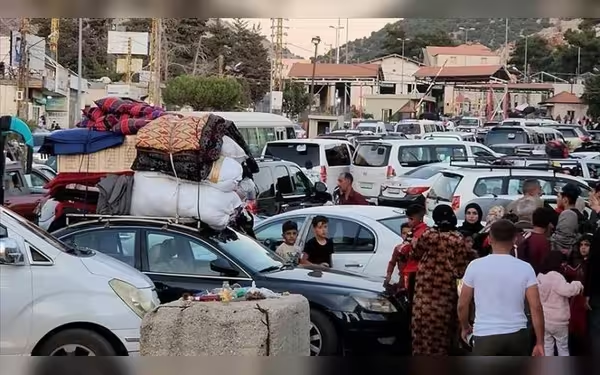Saturday, November 16, 2024 08:29 PM
250,000 People Flee Lebanon to Syria Due to Israeli Attacks
- 250,000 individuals have fled Lebanon since September 23.
- Israeli airstrikes have caused significant casualties and displacement.
- Humanitarian crisis worsens as families seek safety and basic needs.
 Image Credits: nation_pk
Image Credits: nation_pkOver 250,000 flee Lebanon to Syria amid escalating Israeli attacks, creating a severe humanitarian crisis, warns UNHCR chief Filippo Grandi.
In recent weeks, the situation in Lebanon has escalated dramatically due to intensified Israeli attacks, leading to a significant humanitarian crisis. According to the United Nations High Commissioner for Refugees (UNHCR), approximately 250,000 individuals have fled from Lebanon into Syria since September 23. This mass exodus highlights the dire circumstances faced by many as they seek safety from ongoing violence.
Filippo Grandi, the UNHCR chief, reported on social media platform X, stating, "I’m at the Syrian-Lebanese border, where a quarter of a million people have crossed since 23 September." The urgency of the situation is palpable, as local authorities, the Syrian Red Crescent, and various humanitarian partners are working tirelessly to provide assistance to those affected by the conflict.
Grandi's visit to the region included meetings with officials and individuals who have been displaced by the Israeli airstrikes. He emphasized that hundreds of thousands of people are now left destitute, struggling to find shelter and basic necessities. The scale of the destruction is staggering, with reports indicating that Israeli airstrikes have resulted in the deaths of 1,251 people and injuries to 3,618 others. Furthermore, more than 1.2 million individuals have been displaced as a result of the ongoing violence.
Since September 23, Israel has conducted extensive airstrikes across Lebanon, targeting what it claims are Hezbollah positions. Despite international calls for restraint, the situation has only worsened. On October 1, Israel escalated its military operations by launching a ground invasion into southern Lebanon, further complicating an already volatile situation.
The humanitarian implications of this conflict are profound. As families flee their homes, they face not only the immediate dangers of violence but also the long-term challenges of displacement. Access to food, clean water, and medical care becomes increasingly difficult in such crises. The international community must pay attention to these developments and work towards a peaceful resolution to prevent further suffering.
The plight of those fleeing Lebanon serves as a stark reminder of the human cost of conflict. As the situation continues to evolve, it is crucial for global leaders and organizations to prioritize humanitarian aid and support for those affected. The hope for peace and stability in the region remains, but it requires concerted efforts from all parties involved to ensure that the rights and dignity of displaced individuals are upheld.













